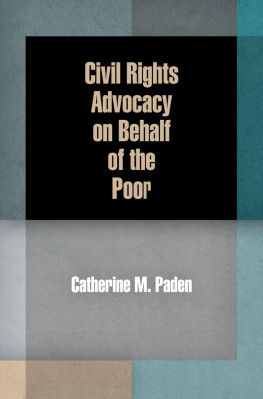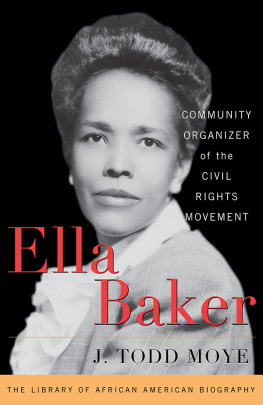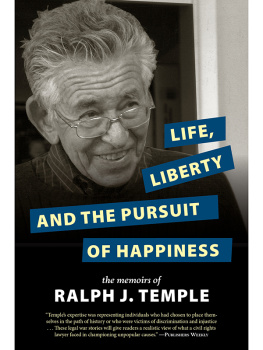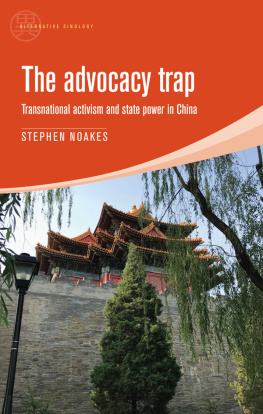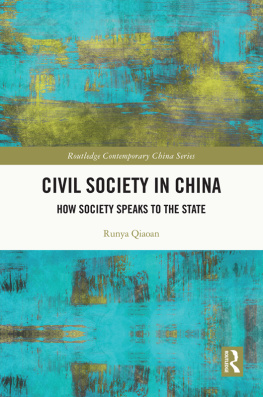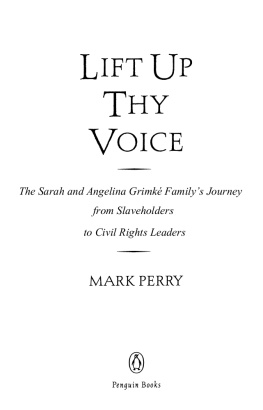Copyright 2011 University of Pennsylvania Press
All rights reserved. Except for brief quotations used for purposes of review or scholarly citation, none of this book may be reproduced in any form by any means without written permission from the publisher.
Published by
University of Pennsylvania Press
Philadelphia, Pennsylvania 19104-4112
www.upenn.edu/pennpress
Printed in the United States of America on acid-free paper
10 9 8 7 6 5 4 3 2 1
Library of Congress Cataloging-in-Publication Data
Paden, Catherine M.
Civil rights advocacy on behalf of the poor / Catherine M. Paden.
p. cm. (American governance, politics, policy, and public law)
Includes bibliographical references and index.
ISBN 978-0-8122-4297-3 (hardcover : alk. paper)
1. African AmericansCivil rightsSocieties, etc.History20th century. 2. Social advocacyUnited StatesHistory20th century. 3. Civil rights movementsUnited StatesHistory20th century. 4. PoorUnited StatesHistory20th century. 5. Poor African AmericansHistory20th century. I. Title.
E185.615.P26 2011
323.1196'073dc22 | 2010018011 |
Chapter 1
Anti-Poverty as a Civil Rights Issue?
I think certainly Katrina really underscored a real problem weve had in terms of black leadership... Im talking about specifically black elected officials, black Democrats... and also the mainstream civil rights organizations: the NAACP, Southern Christian Leadership Conference, and, to an extent, the Urban League.... What weve seen... post-Katrina, during Katrina, and pre-Katrina... [is] a neglect of the African-American poor in terms of proactive policy initiatives, an active lobbying voice for a comprehensive program to deal with black poverty. What were really talking about is a leadership that ignores, in terms of a comprehensive agenda, the poorest of the poor.
Earl Ofari Hutchinson, President, Los Angeles Urban Policy Roundtable, News and Notes with Ed Gordon, NPR, September 23, 2005
On August 28, 2005, Hurricane Katrina made landfall in New Orleans, eventually killing between fifteen hundred and two thousand people and leaving tens of thousands homeless. The images of New Orleans surprised some Americans, who were struck by the poverty there and that the majority of those affected were African American.
As Americans scrambled to understand the impact of Katrina and to respond to the devastation, charitable organizations and advocacy groups swung into full gear raising money, finding volunteers, and offering commentary and explanations of the inequality Katrina brought to light. Among the active groups were civil rights organizations, which mobilized their membership, set up field offices in Louisiana and Mississippi, and made advocacy at the federal, state, and city levels a priority. This advocacy might not seem particularly surprising: given the conflation of race and poverty in the general perception, it may seem apparent that civil rights groups that are focused on racial equality would also advocate for the poor.
However, as the quote at the beginning of this chapter reflects, representation of the poor has never been the top priority of civil rights organizations, which exist to eradicate racially prejudiced and discriminatory practices and policies. Literature on the activities and ideologies of civil rights groups argues that such organizations have functioned with a distinct middle-class bias since well before the 1960s civil rights movement (Goluboff 2007; A. Reed 1999; Marable 1985). Additionally, all political organizations face disincentives to represent the poor: such advocacy is expensive, politically unpopular, and often involves trade-offs with other issues that are more central to organizations missions.
Nonetheless, because of the disproportionate effects of poverty on African Americans, civil rights groups have historically considered economic issues and issues of poverty to be inherently part of their missions. Although they varied in their chosen tactics and strategies, groups such as the Student Nonviolent Coordinating Committee (SNCC) and the Southern Christian Leadership Conference (SCLC) were particularly concerned with African American economic freedom. Organizations and activists struggled to balance their commitment to sometimes radical economic goals with the necessity of working toward civil rights goals that were palatable to white liberals and policymakers (Jackson 2007). For many activists and leaders, the goals of civil rights were inseparable from those of economic equity because activists on the frontlines were struggling to overcome both racial and economic oppressions. As John Lewis, former SNCC chairman, explained:
People have said that the civil rights movement was a middle-class movement.... But, a lot of the people that made up the rank and file of that movement, the people that got arrested and went to jail, the people
Additionally, middle-class African Americans might have particular interests in addressing issues of economic inequality. Research demonstrates that middle and upper class African Americans, who largely compose the membership of civil rights organizations, do not consider their own interests to be far removed from those of the African American poor. Scholars have found that African American middle-class status may be fragileAfrican Americans have less wealth and income than middle-class whites, and contend with housing segregation and discrimination as do the African American poor (Pattillo-McCoy 1999; Oliver and Shapiro 1995). Michael Dawson finds that shared interests based on race lead middle-class African Americans to care more about issues affecting the poor than their class status would predict (Dawson 1994).
Dawsons (1994) findings have spurred arguments about whether the emphasis on linked racial fate masks differences, and different interests, among African Americans. Although policy-makers and organizational leaders evoke linked racial fate with claims to represent all African Americans, scholars have found that such claims are often accompanied by inactivity on behalf of nondominant subgroups. For example, Cathy J. Cohen (1999) finds that African American leadership largely neglected the disproportionate impact of HIV/AIDS on African Americans. Borrowing from her theory of primary and secondary marginalization, we could define organizational constituencies as either primary or secondary based on their level of marginalization within, and outside of, the organization (Cohen 1999). Often, the definition of a groups primary constituency is noncontroversial; it would be difficult to argue that the NAACP was not founded to represent African Americans. However, such broad identities are often difficult to translate into organizational priorities. Therefore, primary constituencies often dominate organizational priorities whereas secondary constituencies receive less attention, or are ignored altogether.
Additionally, advocacy that is considered to be relevant to an organizations overall constituency often carries implicit, and sometimes explicit, class biases. For example, civil rights organizations relatively recent focus on affirmative action policies is interpreted by some scholars as the representation of middle-class interests, to the neglect of low-income African Americans (A. Reed 1999; Marable 1985). Skocpol argues that since the 1960s, professionally managed identity-based groups, such as civil rights organizations, have abandoned the interests of the poor and working classes, and solidarity across class lines has decreased (Skocpol 2003). In her Survey of National Economic and Social Justice Organizations, Strolovitch (2007) demonstrates that organizations claiming to represent all African Americans give disproportionate attention to issues affecting the wealthy and highly educated. She finds that civil rights organizations focus substantially more attention on affirmative action in higher education, an issue that affects an advantaged subgroup of their constituency, and less on welfare reform, an issue that affects a disadvantaged subgroup of their constituency (Strolovitch 2007, 121). These subpopulations often do not have the resources to establish their own organizations, and therefore are forced to rely on groups representing the broader constituency for possible representation of these specific interests (Robnett 2000). Therefore, whether civil rights organizations represent the poor is, in fact, an empirical questionsuch representation cannot be assumed.


